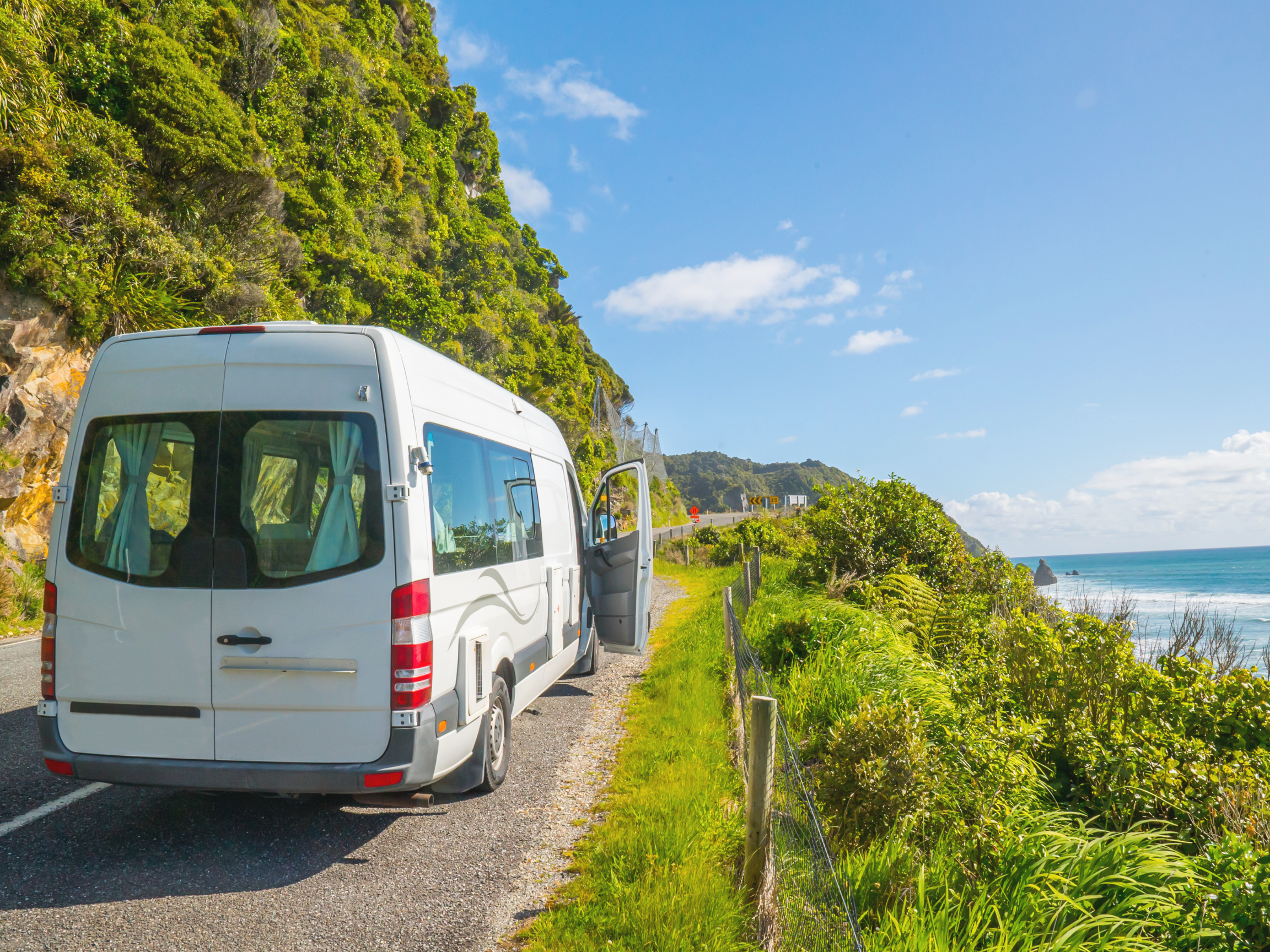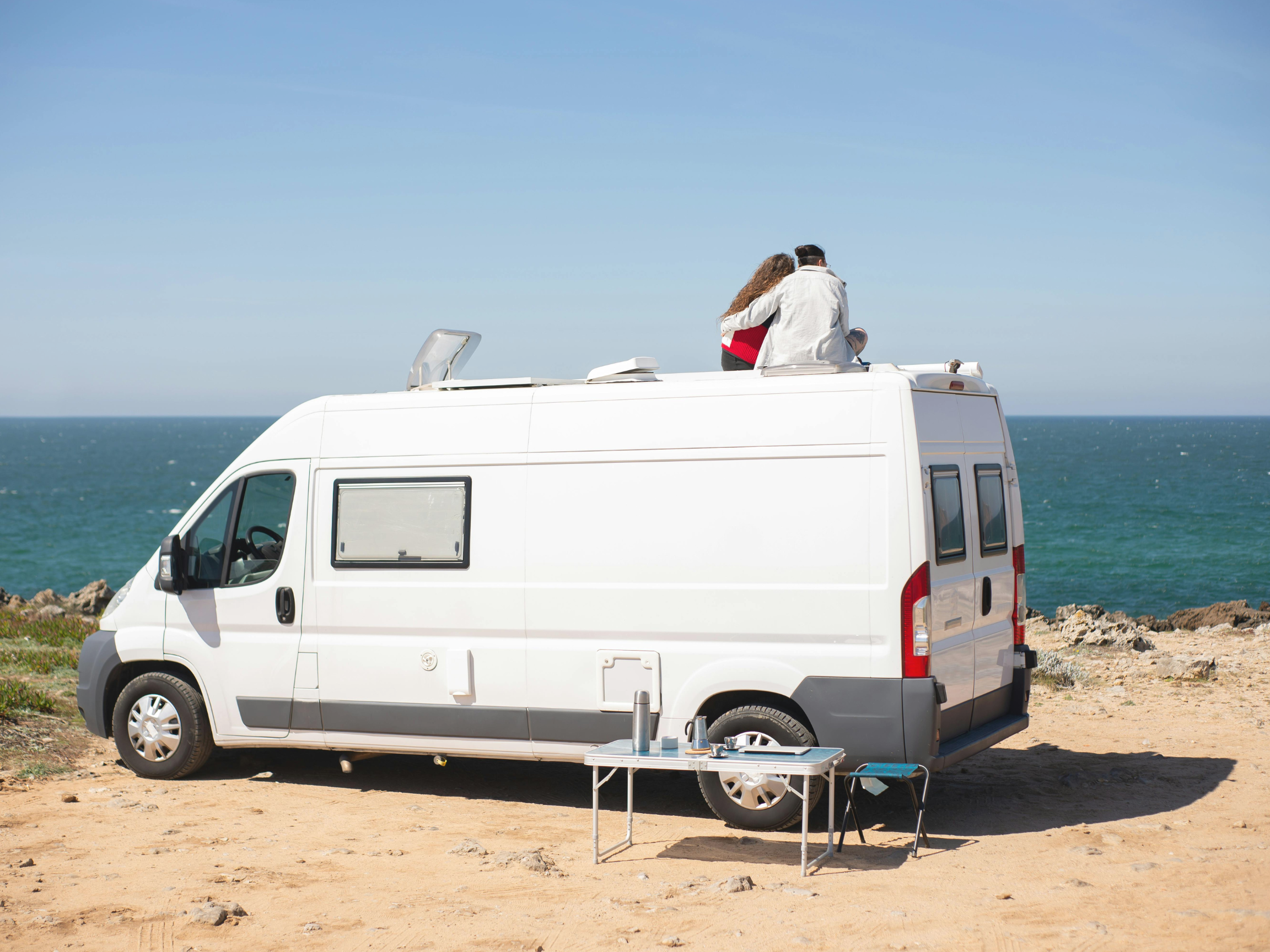If you’re considering a van conversion, you need to consider the total weight of the van before you set off on your adventure. Campervan weight is not something most people think about when undertaking a van conversion project, but it is an essential measurement that every van owner needs to know.
In this article, we’ll talk about campervan weight – how to figure it out, and why you need to know it. Let’s dive in!
Table of Contents

Why Do I Need to Know My Camper Van Weight?
The weight of your camper van is critical to the safety and proper operation of the vehicle. Put simply: the van is only built to carry so much stuff. Overloading the maximum allowed weight can affect the weight distribution of the vehicle, affect vehicle stability, and lead to accidents. It can also impact the performance of the tires and axles, deteriorate braking performance, wear out the shocks, and more.
As a van owner and potential van lifer, knowing how much weight you can add during your buildout and how much cargo you can carry with you on a daily basis is critical so you don’t overshoot and go over the maximum allowable weight.
You probably want the maximum allowable weight you can get – after all, you’re carrying your whole life with you. Let’s look at a weight breakdown and how to determine your van conversion weight.

Gross Vehicle Weight Rating
The gross vehicle weight rating (GVWR) is the manufacturer-decided-upon maximum weight that your vehicle can be. Note: this isn’t the maximum load it can carry. This is the total weight of the van plus cargo. This includes fuel levels and passengers.
This is the first number you’ll need to know when figuring out how much weight you can add during your van build.
Gross Axle Weight Rating
This is the amount of weight that each axle can take individually. It isn’t necessary to know for the weight limits we’ll be talking about today, but it’s good to know what the GAWR of your vehicle is and to know what this measurement means.
Curb Weight
The curb weight is the weight of the vehicle without any cargo but includes full levels of liquids like fuel. Essentially, this is the “empty weight” or weight of the chassis, including the rear axle weight, hitch weight, wheels, tires, etc.
Curb weight does not include modifications you make during the van conversion. According to the manufacturer, those modifications would be considered cargo and would be included in the gross vehicle weight.

How Much Weight Can I Add to My Van?
There are a couple of parts to this question. First of all, you need to know how much weight you can add during the buildout. Second, you need to know how much weight the van can carry after the buildout.
Total Payload Weight
The payload weight is how much weight you can add to the camper van via cargo and your build. To get the total weight of the payload, subtract the curb weight from the gross vehicle weight rating:
Total Payload Weight = GVWR – Curb Weight
Conversion Weight
If you’re trying to figure out how much weight you added during the conversion process (i.e., via permanent fixtures like solar panels, fresh water tank, house batteries, etc.) then you are figuring out the conversion weight. The conversion weight includes any additional weight you needed to add to the van in order to turn it into a home for van life.
To get the conversion weight of your van, you’ll simply need to weigh the van after you complete the build, then subtract the curb weight from this number:
Conversion Weight = Weight After Build – Curb Weight
Cargo Carrying Capacity
Once you know your conversion weight, you can figure out your cargo carrying capacity – the weight capacity you have left for removable cargo. In van life terms, cargo weight includes all your “stuff” (bikes, clothes, laptops, bedding, tents, shoes, etc. etc. etc.) plus you and any other people or pets that will be living in the van.
To figure out your cargo payload capacity, subtract your curb weight and conversion payload weight from the GVWR:
Cargo Carrying Capacity = GVWR – Curb Weight – Conversion Weight


How Can I Figure Out How Much My Van Weighs?
Now you know what your motorhome weight should be, you need to know how to weigh your camper van to ensure you don’t go over. The manufacturer-provided GVWR and curb weight are a good start, but how can you figure out the actual weight of your camper conversion after you finish it?
Truck Stops
Every truck stop has a CAT scale or weighbridge – a certified scale used to figure out how much freight trucks and trailers weigh. These are open to any RV or motorhome with no appointment needed. You can just drive into the truck stop, drive onto the platform, press a button, and get your truck weight. This typically costs anywhere from $10 to $25 and will give you a very accurate measurement.
Four Corner Weigh
This is a more expensive and less readily available option that requires an appointment, but it gives you a much more detailed picture of not only your motorhome weight but also the weight on each axle and weight distribution across each wheel.
To find a four corner weigh, you’ll usually need to contact an RV club or rally. These usually cost anywhere from $60 to $100.

Portable Weight Scale
A portable weigh scale is a device you can use to measure your camper van at home. Simply lay it on the ground on a flat surface like a driveway and drive over it with each wheel of the vehicle.
The scale records the measurement of each wheel and then outputs the total weight of the vehicle. It can also tell you the weight distribution on the left and right-hand sides of the van, which is an important factor in keeping the correct vertical center in a fully loaded vehicle.
The drawback to this method is cost: a Berger Reich Portable Weighbridge costs at least a few hundred dollars and it can be hard to find a distributor in the US. While you may be able to find a Berger Reich Weighbridge on eBay, you’re unable to buy directly from the manufacturer. so if you don’t plan to weigh your van very often, the upfront cost might not be worth it, and you’re probably better off seeking out a truck stop.
Weight Considerations and Your Vehicle's Safety
Many factors affect vehicle weight beyond the weight of the actual vehicle. When you weigh your vehicle, always make sure to fill up the liquid tanks first. This includes the gas tank, water tanks, engine fluids, propane tanks, air conditioning fluid, washer fluid, etc. You want to know how much your vehicle weighs at maximum capacity, and things like a full tank of gas add a lot of extra weight.
Try to weigh the vehicle when it is carrying its usual cargo payload, including the number of passengers. Also, keep in mind that towing capacity is a separate measurement that may need to be accounted for if you plan on towing a trailer or other tow vehicle.

How to Save Weight During a Build
There are many lightweight materials that can be used in place of standard equipment. For example, consider bamboo instead of hardwoods. Go with lithium-ion batteries instead of AGMs. Reduce the size or number of windows you plan to install (glass is quite heavy.)
Sometimes, you may have to compromise. If you can’t justify the weight of both a roof rack and a wood-burning stove, decide which one is most important to your lifestyle. Can you bring one bike instead of two? Can you leave one of your kids behind (kidding!)
Conclusion
Knowing the average weight breakdown of your vehicle is important. It can save you money in the long run by saving your shocks, axles, and other replaceable parts, and it can mean the difference between life and death on a steep grade when your brakes are struggling.
Don’t skip this important step in your van life conversion!


